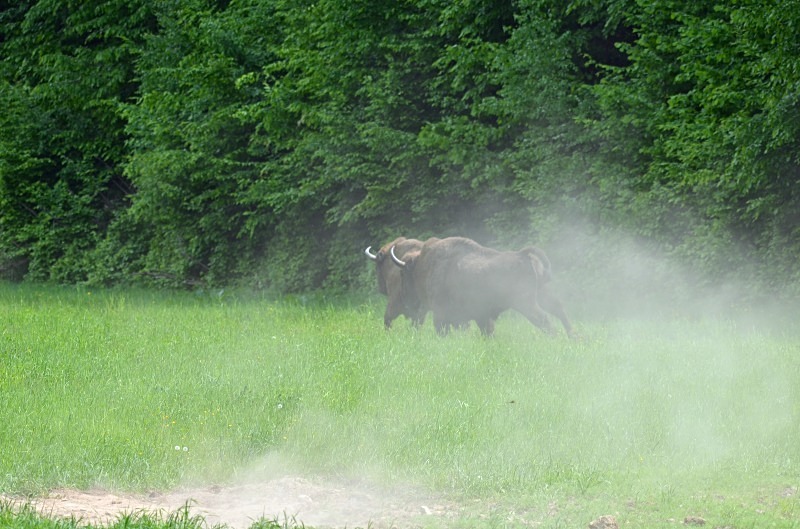European Bison

The European Bison, also known as Wisent, is a Eurasian species of bison. It is one of two species of bison, alongside the American Bison.
The European Bison is the heaviest surviving wild land animal in Europe. A typical European Bison is about 7 to 10 feet long, not counting a tail of 1 to 2 feet long, and 5 to 7 feet tall. In the free-ranging populations of Poland and Belarus, body masses among adults aged 6 years and over are 1,400 pounds on average in the cases of males, with a range of 960 to 1,900 pounds, and of 930 pounds among females, with a range of 750 to 1,200 pounds.
The European Bison has a characteristic thickset body shape with a short neck and a pronounced shoulder hump. There is a longer mane of hair underneath the neck and also on the forehead. The dense coat is dark to golden brown in colour. Both sexes bear short horns that project outwards and then curve up.
Historically, the lowland European Bison's range encompassed all lowlands of Europe but with the increasing human population and the advance of agriculture, vast tracts of the habitat were lost and it’s range became massively restricted. The European Bison was also persecuted by hunting.
The European Bison was hunted to extinction in the wild, with the last wild animals being shot in the Białowieża Forest (on the Poland-Belarus border) in 1919 and in the north west Caucasus in 1927. By that year fewer than 50 remained, all in zoos.
From 1951, it has since been successfully reintroduced from captivity into several countries in Europe, all descendants of the Białowieża or lowland European Bison.
Free-ranging herds are currently found in Poland, Lithuania, Belarus, Ukraine, Romania, Russia, Slovakia, Latvia, Kyrgyzstan, Germany and in forest preserves in the Western Caucasus. Białowieża Forest, an ancient woodland that straddles the border between Poland and Belarus, is now home to around 800 wild individuals.
The total worldwide population is around 4200 (including 2700 free ranging) individuals and has been increasing. In 1996 the IUCN classified the European Bison as an endangered species. It has since been downgraded to a vulnerable species.
Date: 22nd May 2013
Location: Białowieża area, Poland
The European Bison is the heaviest surviving wild land animal in Europe. A typical European Bison is about 7 to 10 feet long, not counting a tail of 1 to 2 feet long, and 5 to 7 feet tall. In the free-ranging populations of Poland and Belarus, body masses among adults aged 6 years and over are 1,400 pounds on average in the cases of males, with a range of 960 to 1,900 pounds, and of 930 pounds among females, with a range of 750 to 1,200 pounds.
The European Bison has a characteristic thickset body shape with a short neck and a pronounced shoulder hump. There is a longer mane of hair underneath the neck and also on the forehead. The dense coat is dark to golden brown in colour. Both sexes bear short horns that project outwards and then curve up.
Historically, the lowland European Bison's range encompassed all lowlands of Europe but with the increasing human population and the advance of agriculture, vast tracts of the habitat were lost and it’s range became massively restricted. The European Bison was also persecuted by hunting.
The European Bison was hunted to extinction in the wild, with the last wild animals being shot in the Białowieża Forest (on the Poland-Belarus border) in 1919 and in the north west Caucasus in 1927. By that year fewer than 50 remained, all in zoos.
From 1951, it has since been successfully reintroduced from captivity into several countries in Europe, all descendants of the Białowieża or lowland European Bison.
Free-ranging herds are currently found in Poland, Lithuania, Belarus, Ukraine, Romania, Russia, Slovakia, Latvia, Kyrgyzstan, Germany and in forest preserves in the Western Caucasus. Białowieża Forest, an ancient woodland that straddles the border between Poland and Belarus, is now home to around 800 wild individuals.
The total worldwide population is around 4200 (including 2700 free ranging) individuals and has been increasing. In 1996 the IUCN classified the European Bison as an endangered species. It has since been downgraded to a vulnerable species.
Date: 22nd May 2013
Location: Białowieża area, Poland

|















